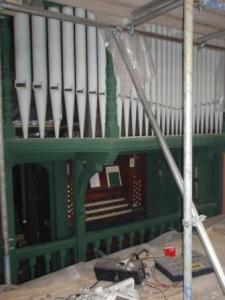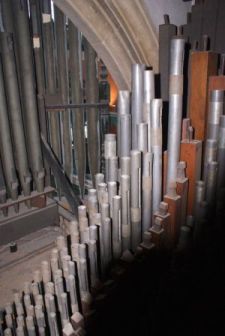
St Michael & All Angels Organ and Parish Rooms Appeal
How the project was announced in 2009
St Michael & All Angels - New Organ Project
 What is planned?
What is planned?
To replace the existing organ (right) with a new instrument, at floor level, remodelling the space and building a new sacristy beneath. Right: The organ is seen close up - from the scaffolding when the church was being repainted.
Why do we need a new organ?
The existing one was second-rate when it was built 120 years ago. Today it is on its last legs. Repeated alterations have left a hotch-potch - poorly-sited, muffled in tone and out of keeping visually with the rest of the church.
Three independent experts recently surveyed the organ. Each believed the best course of action - musically and financially - is to replace it. We have talked about sorting out the organ for more than 20 years. It is time to act.
What advantages will it bring?
The improvement in sound will be very significant. The organ will be able to lead the congregation’s singing properly and accompany a wider range of choral music. It will add to the quality of our worship, and properly maintained it will last for centuries. It will be a teaching resource, adding to the church’s growing role as a centre of music.
A better organ will attract better musicians for concert and recitals.
Can’t the existing organ be repaired?
The sound which the pipes make has always been poor. An overhaul will not change that, and will be expensive – as much as £200,000. The organ would still be in the wrong place to produce a really good sound.
What if we don’t act now?
In the not-too-distant future the organ will stop working. That would have a very grave effect on the quality of our worship at St Michael's. It may carry on making a noise for some years but the organ is gradually becoming unplayable. So far, the problems are most noticeable to the organists, who have become adept at masking the organ’s shortcomings, but it will accelerate. By acting now we will avoid a crisis.
Where will the new organ go?
Organ pipes need space above and around them for the sound to develop and ‘speak’ out into the church. Our organ was raised above its original floor level position in the 1920s, taking away that space and leaving the sound muffled.
Lowering the organ will improve the sound while restoring Norman Shaw’s original lay out. The plans are not finalised, but it is hoped the archway to the north of the pulpit - filled in 90 years ago - will be re-opened above the existing wood panelling, restoring the church’s symmetry.
How will a new organ affect the appearance of the inside of the church?
We believe it will mean a marked improvement. All three experts who examined the current organ were of the view that the current organ case is unlovely, especially in comparison to the rest of the church - just a row of dull pipes. The case was not designed for the church, but was a stock design from the builder.
A new case will undoubtedly be more beautiful, and by careful and sympathetic design can also be better integrated with the design of the church.
Why not buy an electronic instrument?
This would cost in the region of £30,000, with a lifespan of 15 to 20 years - not necessarily a good investment. The quality of electronic instruments has improved in recent years but they still do not sound like the real thing. A synthesised organ would not attract organists and musicians in the same way, and would hinder our ability to stage concerts and recitals.
Why do we need a new sacristy?
Moving the organ back to floor level will fill in part of the existing sacristy – the small room where the clergy robe and pray before services, and where wafers, wine, chalices etc. are prepared and stored. The new sacristy will use what’s left of the existing space for storage, and we are looking at options for additional space – possibly a small extension into the rear car park, or creating more floor space above the existing vestry.
The sacristy is essential for the Anglo-Catholic worship we enjoy at St Michael’s - the clergy need somewhere to robe.
How much will it all cost?
Our best estimate is £500,000, including the new sacristy. We will have a final figure once the brief is fully developed, and a bid selected.
How long will it take?
We don’t anticipate building work starting until 2012. It should last about six months.
Can we see plans of how it will look?
Before long, yes. Detailed plans will be available once a bid is selected.
How will we raise the money?
We don't need all the money right now, as the project will take some years. We hope to finance it chiefly using the church's share of income from Green Days and the Festival, some of the income from the hall and through charitable grants - all supplemented by specific fund-raising. We may borrow initially from the diocese, as we did to refurbish the hall and to repaint the church.
How will this fit in with other charitable giving and projects?
It will run alongside them. We hope to raise the money gradually over a number of years, without interrupting other forms of charitable giving, or projects such as youth work.
Renewing the organ is not an alternative to charitable giving. It will be one strand of that giving.
Why does the organ matter?
It is used for almost all our services, several times a week, from a small gathering for a funeral to 700 people at the Crib Service, and everything in between. The organ leads the congregation’s singing and supports the liturgy. We have two thriving choirs, and our choral services are appreciated as an important part of our distinctive style at St Michael’s, and of our outreach - helping to bring people to know God through worship.
We hope the new organ will be used extensively for teaching, and can become a different form of youth outreach.
What does it mean for our mission as a church?
Glorifying God or loving God means deep and dignified worship, which has a transforming effect.
Music is an important part of our worship, and the excellence of our musical and liturgical traditions attract many people to join our congregation
Church music helps us express our shared gladness in the love of God in Jesus Christ. A new organ is an investment in our future ministry.
Where can I find out more?
There will be a meeting in the church on Sunday May 17th when there will be a fuller presentation and time for questions.
If you can’t be there, or want to ask questions beforehand, please talk to any PCC member (see the porch notice board for a Who’s Who) or to music director Jonathan Dods. You can email Jonathan at: jondods@yahoo.com
We hope to display more detailed information in church shortly.
Jonathan Dods & Matthew Hickley - May 2009
Back to our Organ & Parish Rooms Appeal page